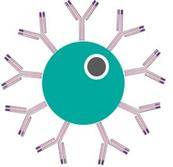
TIPS Microparticles for Adoptive T Cell Therapy
This project investigates a novel approach for adoptive T cell therapy that involves using biodegradable, biocompatible TIPS microparticles to stimulate a targeted, tumour-specific effector response and expansion of T cells in the immunosuppressive tumour microenvironment. If successful, the proposed technology will provide a step-change for adoptive cell therapy by improving tumour immunity and reducing the risk of toxicities that arise from on-target/off-tumour cross reactivity. The project involves functionalisation of TIPS particles with azide groups necessary for Strain-Promoted Azide-Alkyne Cycloaddition (SPAAC) that will enable conjugation of antibody fragments to the surface of solid PLGA particles.
People involved:
- Professor Richard Day
- Dr Vijay Chudasama, UCL Department of Chemistry
- Mr João Carlos Nogueira, UCL Department of Chemistry
Artificial Lymph Nodes for Ex Vivo T Cell Activation

This BBSRC-funded PhD project involves designing materials to control immune cell behaviour. In particular, the project explores integrating engineering principles with immunology to create biomaterials that can quantitatively control T cell activation and expansion. Towards this goal, the project is investigating how immune cells respond to biophysical and biochemical cues over different time and length scales. It is hoped insights gained from these studies can be used to improve adoptive T cell therapy both in terms of cost-effectiveness and processing.
People involved:
- Professor Richard Day
- Prof Marc-Olivier Coppens, UCL Chemical Engineering
 Close
Close

